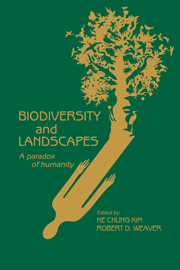Book contents
- Frontmatter
- Contents
- Contributors
- Preface
- Part I Introduction
- Part II Human values and biodiversity
- 2 Thoreau and Leopold on science and values
- 3 Creation: God and endangered species
- 4 Biodiversity and ecological justice
- Part III Human processes and biodiversity
- Part IV Management of biodiversity and landscapes
- Part V Socioeconomics of biodiversity
- Part VI Strategies for biodiversity conservation
- Part VII Biodiversity and landscapes: postscript
- Index
4 - Biodiversity and ecological justice
Published online by Cambridge University Press: 04 August 2010
- Frontmatter
- Contents
- Contributors
- Preface
- Part I Introduction
- Part II Human values and biodiversity
- 2 Thoreau and Leopold on science and values
- 3 Creation: God and endangered species
- 4 Biodiversity and ecological justice
- Part III Human processes and biodiversity
- Part IV Management of biodiversity and landscapes
- Part V Socioeconomics of biodiversity
- Part VI Strategies for biodiversity conservation
- Part VII Biodiversity and landscapes: postscript
- Index
Summary
Introduction
The title of this essay requires explanation. The idea of “biodiversity” is rarely conjoined with the idea of “justice.” This is because “biodiversity” is a scientific concept, whereas “justice” is, in part, normative. So I will have to explain why I believe the conjunction makes sense. The use of the adjective “ecological” to modify the concept of justice also requires explanation. Once again I have combined a scientific idea – that of ecology – with the normative idea of justice. Does this combination make sense? Is it possible to think of a system of justice that is ecological as well as being normative, political, social? Or is this a hopeless jumble of incompatible and contradictory ideas?
I will show that this seemingly contradictory combination of scientific and normative concepts is necessary for a full understanding of the moral dimensions of biodiversity. I will argue that only by developing a system of justice that can properly be called “ecological justice” can we morally justify policies that preserve the biodiversity of the planet. If we remain trapped in the traditional categories of normative thought we will be unable to justify acceptable and necessary environmental policies.
Two preliminary warnings: First, it must be emphasized that this essay is an exercise and argument in applied moral philosophy. It is an examination and criticism of a set of normative beliefs underlying various kinds of environmental policy. Philosophical arguments have their own standards of proof, which differ in important ways from the standards of scientific proof.
- Type
- Chapter
- Information
- Biodiversity and LandscapesA Paradox of Humanity, pp. 61 - 74Publisher: Cambridge University PressPrint publication year: 1994



